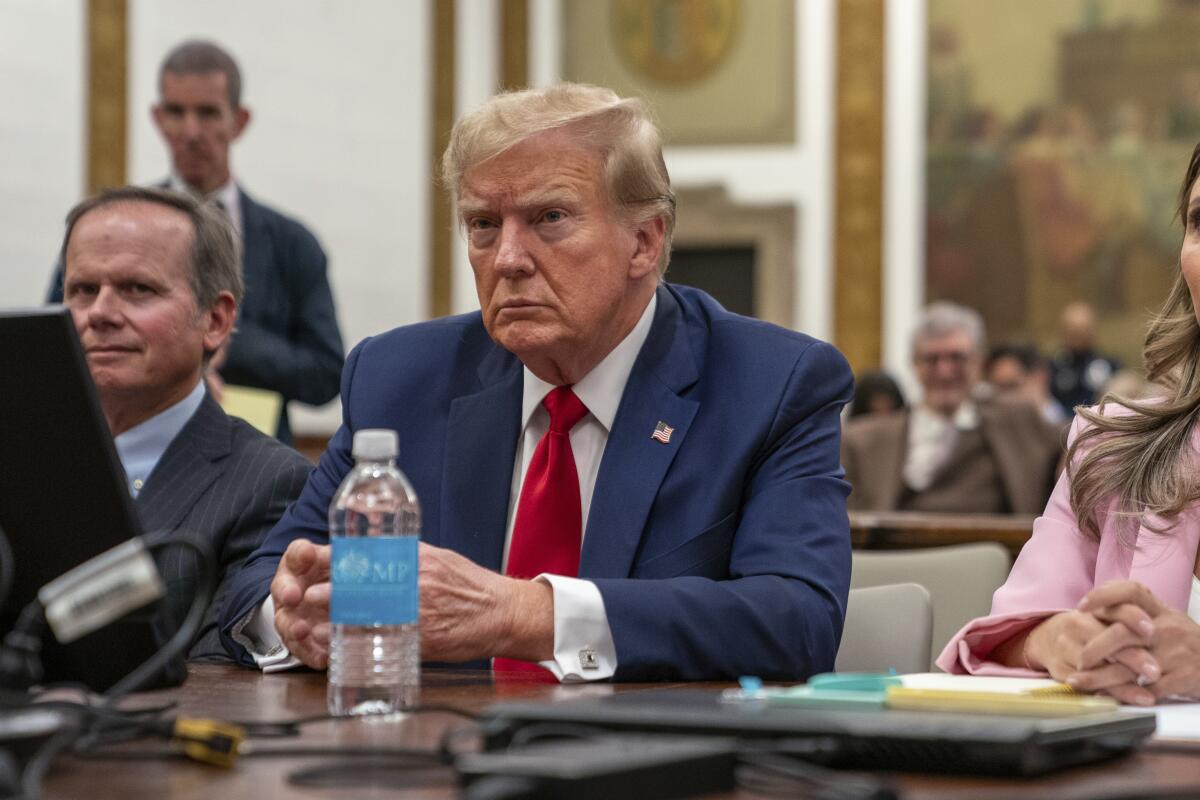New York increases penalties sought in Trump’s fraud trial to $370 million

- Share via
NEW YORK — Lawyers for New York state on Friday increased their request for penalties to more than $370 million in former President Trump’s civil trial for business fraud.
Trump, whom the judge in the case has already found liable for fraud, retorted: “They should pay me.”
The exchange came as lawyers for both sides filed court papers highlighting takeaways from the trial ahead of closing arguments, set for Thursday. Trump is expected to attend.
It will be the final chance for state and defense lawyers to make their cases. The civil lawsuit, which accused the Republican presidential hopeful of deceiving banks and insurers by vastly inflating his net worth, is consequential for him even while he fights four criminal cases in various courts.
The judge in the non-jury trial is set to determine how much Trump must pay based on the earlier ruling that Trump’s financial statements were fraudulent.
The New York civil case could end up barring him from doing business in the state where he built his real estate empire, in addition to the $370-million penalty, plus interest, sought by state Atty. Gen. Letitia James — up from a pretrial figure of $250 million, raised to more than $300 million during the proceeding.
The state says the new sum reflects windfalls from wrongdoing; chiefly, $199 million in profits from property sales and $169 million in savings on interest rates, as calculated by an investment banking expert hired by James’ office.
L.A. city commissioners are barred from privately discussing contracts that they will be later voting on. Two DWP commissioners spoke privately with a vendor but deny breaking any rules.
Trump bristled at the proposed penalty in an all-caps post on his social media platform, contending that “there was no victim, no default, no damages.”
He complained that the attorney general was seeking $370 million and instead “should pay me,” asserting that businesses are fleeing New York.
According to the state U.S. Labor Department, the number of private-sector jobs in New York increased 1% in the year to November 2023, compared with 1.6% nationally.
James’ office argued in a filing Friday that Trump got attractive rates on loans and insurance because of the wealth he claimed on his personal statements offinancial condition, or SFCs. That wealth was vastly inflated, according to the lawsuit, which accused Trump, his company and key executives of deceiving banks and insurers.
The suit alleged that the documents gave exorbitant values for Trump’s golf courses, hotels and more, including a former home in his namesake tower in New York and his current home at the Mar-a-Lago club in Palm Beach, Fla.
“The conclusion that defendants intended to defraud when preparing and certifying Trump’s SFCs is inescapable,” Kevin Wallace, a lawyer in James’ office, wrote in a filing Friday. “The myriad deceptive schemes they employed to inflate asset values and conceal facts were so outrageous that they belie innocent explanation.”
The defendants, including the former president’s sons Donald Trump Jr. and Eric Trump, deny any wrongdoing.
Trump asserts that his financial statements came in billions of dollars low, and that any over-estimations — such as valuing his Trump Tower penthouse at nearly three times its actual worth — were mere mistakes and made no difference in the overall picture of his fortune.
He alleges the documents are legally bulletproof because the numbers weren’t audited, among other caveats. Recipients understood them as starting points for their own analyses, the defense says.
None of his lenders testified that they wouldn’t have made the loans or would have charged more interest if his financial statements had shown different numbers, defense lawyers wrote in a filing Friday. The state “adduced no factual evidence from any witness that the gains were ill-gotten,” Michael Madaio and Christopher Kise wrote. Nor, they said, was there proof that insurers were ripped off.
Separately, defense lawyers argued that claims against Eric Trump and Trump Jr., who serve as executive vice presidents of the Trump Organization, should be dismissed because they never had “anything more than a peripheral knowledge or involvement in the creation, preparation, or use of” their father’s financial statements. The two relied on the work of other Trump Organization executives and an outside accounting firm that prepared those documents, their attorneys said.
The verdict is up to the judge because James brought the case under a state law that doesn’t allow for a jury. Judge Arthur Engoron has said he hopes to decide the amount of the penalty by the end of this month.
He will weigh claims of conspiracy, insurance fraud and falsifying business records.
Engoran ruled before trial on the lawsuit’s top claim, finding that Trump and other defendants engaged in fraud for years. With that ruling, the judge ordered that a receiver take control of some of the ex-president’s properties, but an appeals court has frozen that order.
In addition to penalties of $370 million, plus interest, James wants Trump to be prohibited from doing business in New York.
During the trial, Engoron fined Trump a total of $15,000 after finding that he violated a gag order that barred trial participants from commenting publicly on the judge’s staff. The order was imposed after Trump maligned the judge’s principal law clerk.
Trump’s lawyers are appealing the gag order.
More to Read
Get the L.A. Times Politics newsletter
Deeply reported insights into legislation, politics and policy from Sacramento, Washington and beyond. In your inbox twice per week.
You may occasionally receive promotional content from the Los Angeles Times.











